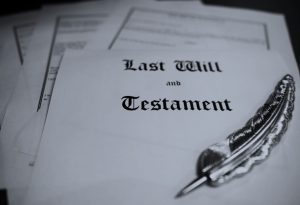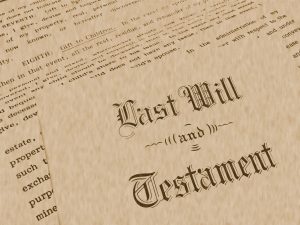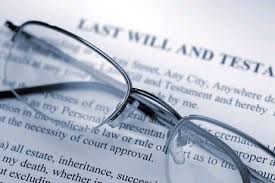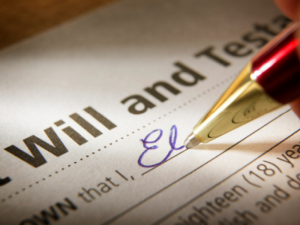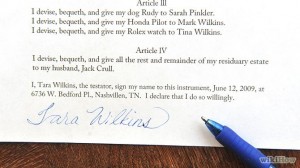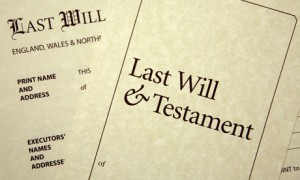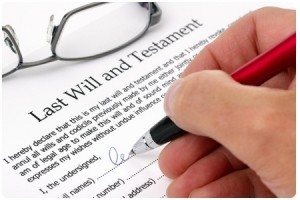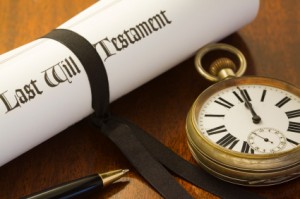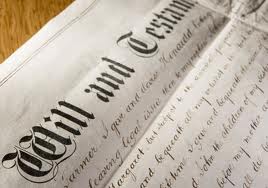Problems That Can Arise If A New York Will Is Not Properly Executed
Numerous problems can arise if a New York Last Will and Testament is not properly executed. This is one of the reasons why it is so important to have an experienced estate planning attorney draft and oversee the signing of a Will. If one is only interested in having the attorney prepare a Will, the Read on…
What Happens To Properties Purchased By A Decedent After A Will Is Executed?
It is quite common for life events to change after a person writes their Last Will and Testament. Quite often, there may be a death or birth in the family, their can be a relocation to a new area, or a change in careers. Quite often, after a Will is executed, additional real property may Read on…
Does Your Will Need To Be Revised Over A Change Of Address?
A question often arises when I prepare a will for a client and they are contemplating a change of address. Whether that moves takes them to the next town, next county, or another state, the question of will revision comes into play. The simple answer is that if you were a New York resident and Read on…
What Happens To A Bank Account When Someone Dies Without A Will?
When the owner of a bank account dies and that account holder did not have a Last Will and Testament, there are a few possible scenarios that can occur. If the account holder was the sole owner of the account and did not have any beneficiary or did not have the account “in trust for” Read on…
Registering Your Will With a Probate Court in New York
When a client executes a Last Will and Testament at my office, the question arises as to which party would like to keep the original last will and testament. Typically, the original will is either kept with the attorney in a secure location like a fire-proof safe or the person executing the will (testator) will Read on…
Frequently Asked Questions Concerning Living Wills and Health Care Proxies
Quite often, people can get confused and interchange the use of the term “living will” and “health care proxy”. While the two terms are not synonymous, they are often combined into one document known as a “Living Will and Health Care Proxy”. Typically, the living will sets forth advanced medical directives for health care professionals Read on…
What Happens To Properties Purchased By A Decedent After A Will Is Drafted?
If a person has a will previously executed, and subsequent to the publication and execution of said will has purchased property, the language of the will shall speak to this issue. While it is important to update a will after a change in life circumstance, another basis to update would be the purchase of a Read on…
How Much Does It Cost To Make A Will?
The question as to the cost to draft a will by an attorney can not be settled with a simple monetary figure. There are so many components that speak to this issue. Above all else, it is imperative that you utilize an experienced estate planning attorney who can properly guide you as to the necessary Read on…
How To Find An Executor For My Will?
The fact that you are contemplating an executor for your Will signifies that you have taken the first step on taking control of your estates when you pass away. Remember that if you don’t have a validly executed Will when you pass away, the laws of intestacy will decide who inherits your estate. In order Read on…
What If The Will Maker (Testator) Becomes Incompetent, Does That Invalidate The Will?
When a will is executed in New York State, one of the requirements of a validly executed will is that the person who is signing the Will (testator) possesses testamentary capacity. But what if the person who created the Will becomes incompetent? Does that invalidate the Will? When is a Will not valid? It is Read on…
Do I Have To Draft A New Will If I Move To Another State?
Do you need to draft a new Will if you move to a different state? This question often occurs when one has a New York Will but is moving to another state. The simple answer is – it depends. In most cases, Wills that are executed in New York will comport to the estate and Read on…
Do I Need To Draft A New Will If I Move From New York To Another State?
The short answer to this questions is “it depends”. As a rule of thumb, I advise clients that if they move from one state to another, it is a good idea to update their will. The reason for this is that a will that was drafted and executed in another state will only be valid Read on…
How To Dispute A Will Based Upon Undue Influence?
New York probate law sets forth very specific objections that one can utilize to contest the validity of a NY Will. The first parameter before even getting to the issue of filing objections is that one has legal standing to initiate such a challenge. Assuming you meet the initial hurdle of having a pecuniary interest Read on…
When A Will Can Be Contested?
When a will can be contested? In order to contest a will, or challenge the validity of a Will seeking admission to probate in New York State, you must have legal standing to commence such a challenge. To challenge that the provisions contained in the will, or the will itself, is invalid, you must have Read on…
I Want to Remove a Non-Relative From My Will. Can I Do That With An Addendum?
If you seek to change or amend some portion of your Last Will and Testament, or seek to write a whole new Will due to changes in life circumstances, it is of utmost importance to seek the advice of an experience estate planning attorney. An improperly drafted or executed will can have serious ramifications insofar Read on…
Why Do-It-Yourself Wills is Not a Good Option
One of the most common reasons for a will to be contested is due to the fact that a lawyer did not prepare or oversee the signing of the will. There are certain “formalities” that must be followed in New York State for a will to be deemed valid by the Surrogates’ Court in which Read on…
When is Someone Notified They Are in A Will?
This is a common question that is asked. People want to know when they would be notified that they are included in a will. While it is not uncommon for a testator to let family members know if they are included in a will, whether to receive personal property, money or real property, generally there Read on…
Three Common Reasons Wills Are Disputed Among Children of the Deceased
The most common scenario for the disputing of a will (wills) by the issue (children) of the deceased is when that child is “disinherited” (i.e. “For my own personal reasons, I leave no provisions for child A”). Basically, that child who is disinherited will make certain claims to justify that the will is not valid, Read on…
What Are The Most Common Reasons A Will Is Contested?
There are essentially four categories of objections that an interested party can make if they are going to object to a Will being admitted to probate. I will give a cursory review of the basis for said objections. The first basis to object to a Will being offered for probate in the Surrogate’s Court is Read on…
What Assets May Not Be Covered By My Will?
It should be noted that there are numerous assets that can be deemed testamentary substitutes, meaning that due to the nature of ownership or the beneficiary scheme, these items may not be covered under the terms of the will. For the most part, if an asset is owned exclusively by the testator-decedent (person who died) Read on…
What is an in terrorem clause (disinheritance) in a last will and testament?
It is not uncommon for a family member to disinherit another in their Last Will and Testament for fears that the person may be a spendthrift or squander monies that the person signing the Will (Testator) worked their whole lifetime to amass. Another method of disinheritance occurs when a Testator seeks to disinherit a family Read on…
What To Do If You Are Written Out Of Your Spouse’s Will?
If you are a surviving spouse, New York State law protects your spousal inheritance rights. As a surviving spouse, you are entitled to at least an “elective share” of the assets. You are entitled to receive one-third of the estate or the greater of $50,000, including properties. Of great importance is that property subject to Read on…
Are lawyers optional when drafting a will?
There are a variety of pitfalls one can encounter if there will is not drafted properly, or if certain “formalities’ are not followed pursuant to the New York Estate Powers and Trusts Law (EPTL) that can make the will vulnerable to a contest by an interested party to the probate proceeding. A skilled estate attorney Read on…
How To Write A Will?
There are some basic questions you should ask yourself when contemplating a will so all relevant information is included and accounted for. Here is a sampling of questions you should ask yourself when putting together your information that will be necessary to will preparation. Please note that this list is by no means exhaustive: Read on…
The importance of having an attorney draft and execute a last will and testament
One of the most important decisions an individual can make is to decide how to dispose of their assets when they pass away. Drafting a properly executed will is crucial to making this important decision a reality. The Estates Powers at Trusts Law (EPTL) set forth certain formalities that have to be followed in order Read on…
Can my lawyer be one of the witnesses to the signing of my will?
The law in the State of New York requires that at there must be at least two, non-interested parties to witness the signing of a will by the testator. This particular aspect of the will signing is crucial because if the will is not properly witnessed by these individuals, it can be declared invalid and Read on…
Dying with no will, no wife, no children or siblings in New York state: what happens?
While a New York wills attorney is normally consulted in the estate planning process, some people choose not to create a will.If you die as a resident of New York State without a will (intestate), the laws of intestacy will control how your estate will be distributed. The rules are set forth in the New Read on…
How To Make Sure Your Will Is Valid?
Estates, Powers and Trusts Law (EPTL) 3-2.1 specifies certain “formalities” that must be followed to ensure the decedent (person who has died) has executed and signed a valid will. Having an experienced Long Island estate attorney guide you through the process will decrease the likelihood that the validity of the will is challenged in Surrogate’s Read on…
Signing a will on Long Island, NY: how many witnesses do I need?
The New York Estate Powers and Trusts Law (EPTL) requires that at least two non-interested parties are required to witness a testator sign a Last Will and Testament. The operative term here is “non-interested party”. For example, any person who is related to the testator by blood or marriage would not be an appropriate party Read on…
What happens if my spouse dies, has a will leaving the house to children, yet we are both titled owners of our house?
When a married couple owns a house, they ordinarily take such property as tenants by the entirety. In simple terms, they are joint tenants with rights of survivorship, meaning that if one spouse dies, the surviving spouse takes ownership of the entire property (i.e. fee interest) by this right of survivorship. This scenario is one Read on…
How to prevent a will contest in New York
Estates, Powers and Trusts Law (EPTL) 3-2.1 specifies certain “formalities” that must be followed to ensure the decedent (person who has died) has executed and signed a valid will. Having an experienced estate attorney guide you through the process will decrease the likelihood that the validity of the will is challenged in Surrogate’s Court. It Read on…
What Happens If You Die Without A Will In New York?
It is a very common question that arises. And the question can occur at any time in one’s life, whether taking that first new job, getting married, having children, getting divorced, or preparing for retirement. “Should I have a will?” is the common question. The emphatic response is “Yes”. There are many reasons to have Read on…
Where Should You Store Your Will After It Is Created?
Clients often ask where they should store their original will after it is drafted and executed by our office. I always give the clients the choice of having our office keep the original will or giving it to the client for safekeeping. A third option, which is used less frequently, is to store your will (the Read on…
How Often Should Your Will Be Reviewed By An Attorney?
When reviewing your will and determining whether it should be updated based on a change in life circumstances, the Law offices of Michael W. Alpert can certainly assist in this regard. Clearly, upon a change in marital status, birth of a child, or the loss of a close family member/beneficiary, it should lead one to Read on…
At What Point In Your Life Should You Get A Will Created?
A simple rule of thumb is that you should have a will drafted depending on two important criteria. For one, when you have a significant change in life circumstances (i.e., marriage, divorce, birth of a child, death in the family), you should seriously consider how you are going to dispose of your assets when you Read on…
What Is A Joint Will?
Speak to your Long Island wills and trusts attorney and he or she will explain to you that a Joint Will is a contract between two spouses to dispose of their property in a particular way. Generally spouses verbally agree to make reciprocal wills leaving their property to each other and upon the death of the Read on…
What Happens If My Spouse Had A Handwritten Will?
A handwritten or holographic will is a will that is written in the own handwriting of a testator. New York law recognizes holographic wills under limited circumstances. For instance, New York law will accept the holographic will of someone who is in the armed services and may be engaged in a conflict or emergency situation Read on…
The Difference Between DWI and Aggravated DWI
Any alcohol or drug-related offense involving a motor vehicle is very serious and should not be taken lightly. Driving While Intoxicated is a crime (misdemeanor or felony depending on a variety of factors). In New York State, the penalties include the loss of driving privileges, fines, probation, and a possible jail sentence. Driving While Intoxicated Read on…
Why Everyone Needs To Have A Will In New York And Beyond
It is a very common question that arises. And the question can occur at any time in one’s life, whether taking that first new job, getting married, having children, getting divorced, or preparing for retirement. “Should I have a will?” is the common question. The emphatic response is “Yes”. There are many reasons to have Read on…

